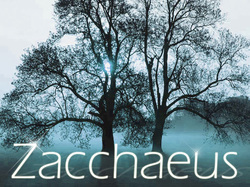 Luke 19:1-10. Zacchaeus, the Patron Saint of Tree Climbers, was -- as the old Sunday school song tells us -- a "wee little man." Zacchaeus was a chief tax collector -- a local entrepreneur who employed other tax collectors to collect all the tolls, tariffs and taxes in the local area, in this case the town of Jericho. The tax collectors could charge the people whatever tax bill they wanted as long as their Roman overseers got paid the appropriate share. Whatever was left over got pocketed by the tax collectors as profit, and no one in that system would have profited more than a man like Zacchaeus. It's no wonder, then, that tax collectors were among the most hated people in first-century Israel. They were the ones who often left their fellow Judeans "up a tree" over their heavy taxes and shrinking incomes. Jesus, however, seemed to gravitate toward these nefarious entrepreneurs. He chose the tax collector, Matthew, to be one of his disciples, and earlier in Luke's gospel, the religious establishment repeatedly mocks Jesus for being a "friend of tax collectors and sinners." Maybe that's why Zacchaeus wants so desperately to see Jesus -- the tax collector doesn't have any other friends, only enemies among the townspeople. Zacchaeus wants to see Jesus so badly, in fact, that he "ran ahead and climbed a sycamore tree to see him because he was going to pass that way" (19:4). As Jesus came into town, he noticed Zacchaeus there, up a tree in more ways than one. For Zacchaeus and for many people who find themselves on the margins of society, being up and away from the crowd can be a safe refuge. Ultimately, however, living in the trees doesn't work. Eventually, you have to come down, and, when you do, it's better to have someone there to catch you. Jesus looked at Zacchaeus hanging on a sycamore branch and said, "Zacchaeus, hurry and come down; for I must stay at your house today" (v. 5). Jesus calls him down from being up a tree, out on a limb and hanging onto life by his fingernails. In doing so, Jesus continues to be guilty as charged for hanging out with all the wrong people. Indeed, the crowd began to "grumble," saying, "He has gone to be the guest of one who is a sinner" (v. 7). Zacchaeus had gone up a tree seeking Jesus, but it was Jesus who came seeking Zacchaeus on his way to Jerusalem. "The Son of Man came to seek out and save the lost," says Jesus, and showing up in the house of this tiny tax collector demonstrated to everyone in the crowd that those who were up a tree in their lives were the ones Jesus was and is seeking. Interestingly, that last statement of Jesus in this passage has most often been used to suggest that saving "the lost" is all about private and personal conversion, which results in getting someone's soul into heaven at death. What happens to Zacchaeus, however, is a much more comprehensive kind of salvation -- It is a salvation that comes to the whole "house" and results in a transformative healing of the whole person in the present, not just the future. The salvation that Jesus offers changes Zacchaeus' life through and through, and, as a result, it benefits those around him. The poor benefit from Zacchaeus' change from greed to generosity, receiving half of the tax collector's possessions, which would have been substantial. Those who have been defrauded by Zacchaeus' corrupt actions will receive a four-fold restitution, making them suddenly solvent and secure again (v. 8). When Zacchaeus is saved, the whole community benefits. When the lost are found, the trees get shaken and everyone enjoys the "fruit" that comes from repentance (3:8). Jesus came looking for people who were up a tree. Indeed, we've all been up a tree ever since that day in the garden when our spiritual ancestors went up a tree looking for something other than God (Genesis 3). Jesus has come to invite us down, to offer us a new life, to live lives that reflect the kind of healing, wholeness and salvation his kingdom brings.
1 Comment
Bruce Oliver
11/7/2013 01:37:03 am
Great story; you notice that Zacchaeus GAVE his money, it was not TAKEN from him. AND that it benefitted the whole community.
Reply
Leave a Reply. |
Rev. Dr. Shannon SmytheUnited Presbyterian Church Archives
March 2023
Categories |
Address 12 Yardville-Hamilton Square Road, Yardville, NJ 08620 Phone 609-585-5770 Email [email protected]

 RSS Feed
RSS Feed